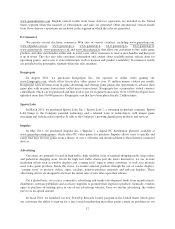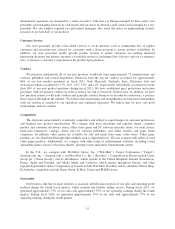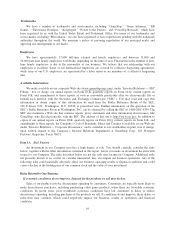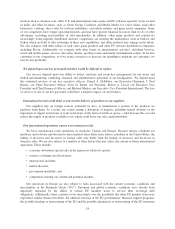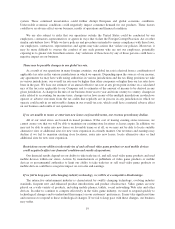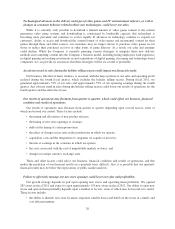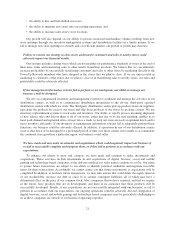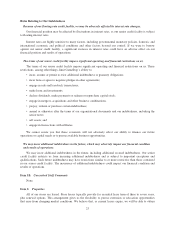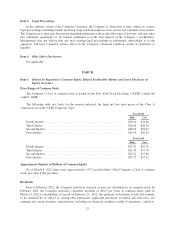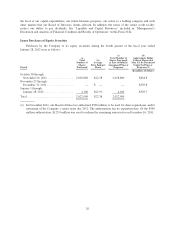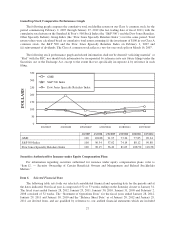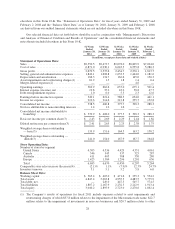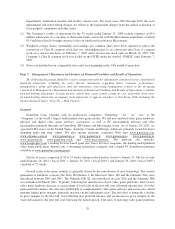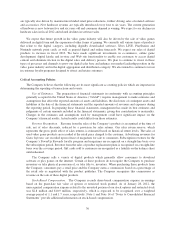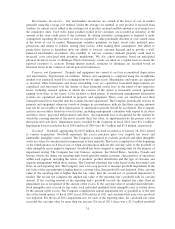GameStop 2011 Annual Report Download - page 38
Download and view the complete annual report
Please find page 38 of the 2011 GameStop annual report below. You can navigate through the pages in the report by either clicking on the pages listed below, or by using the keyword search tool below to find specific information within the annual report.We may not compete effectively as browser, mobile and social gaming becomes more popular.
Gaming continues to evolve rapidly. The popularity of browser, mobile and social gaming has increased
greatly and this popularity is expected to continue to grow. Browser, mobile and social gaming is accessed
through hardware other than the consoles and traditional hand-held devices we currently sell. If we are unable to
respond to this growth in popularity of browser, mobile and social games and transition our business to take
advantage of these new forms of gaming, our financial position and results of operations could suffer. The
Company has been and is currently pursuing various strategies to integrate these new forms of gaming into the
Company’s business model, but we can provide no assurances that these strategies will be successful or
profitable.
Data breaches involving customer or employee data stored by us could adversely affect our reputation and
revenues.
We store confidential information with respect to our customers and employees. A breach of the systems
storing personal account information and other sensitive data could lead to fraudulent activity resulting in claims
and lawsuits against us in connection with data security breaches. Also, the interpretation and enforcement of
data protection laws in the United States, Europe and elsewhere are uncertain and, in certain circumstances,
contradictory. These laws may be interpreted and enforced in a manner that is inconsistent with our policies and
practices. If we are subject to data security breaches or government-imposed fines, we may have a loss in sales or
be forced to pay damages or other amounts, which could adversely affect profitability, or be subject to substantial
costs related to compliance. In addition, any damage to our reputation resulting from a data breach could have an
adverse impact on our revenues and future growth prospects, or increase costs arising from the implementation of
enhanced security measures.
Litigation and litigation results could negatively impact our future financial condition and results of
operations.
In the ordinary course of our business, the Company is, from time to time, subject to various litigation and
legal proceedings. In the future, the costs or results of such legal proceedings, individually or in the aggregate,
could have a negative impact on the Company’s results of operations or financial condition.
Legislative actions may cause our general and administrative expenses or income tax expense to increase
and impact our future financial condition and results of operations.
In order to comply with laws adopted by the U.S. government or other regulatory bodies, we may be
required to increase our expenditures and hire additional personnel and additional outside legal, accounting and
advisory services, all of which may cause our general and administrative costs or income tax expenses to
increase. Changes in the accounting rules could materially increase the expenses that we report under
U.S. generally accepted accounting principles (“GAAP”) and adversely affect our operating results.
We may not pay cash dividends on our common stock in the future.
We initiated our first cash dividend on our common stock during fiscal 2012. Notwithstanding the
foregoing, there is no assurance that we will continue to pay cash dividends on our common stock in the future.
Certain provisions in our credit facility restrict our ability to pay dividends in the future. Subject to any financial
covenants in current or future financing agreements that directly or indirectly restrict our ability to pay dividends,
the payment of dividends is within the discretion of our Board of Directors and will depend upon our future
earnings and cash flow from operations, our capital requirements, our financial condition and any other factors
that the Board of Directors may consider. Unless we continue to pay cash dividends on our common stock in the
future, the success of an investment in our common stock will depend entirely upon its future appreciation. Our
common stock may not appreciate in value or even maintain the price at which it was purchased.
22


